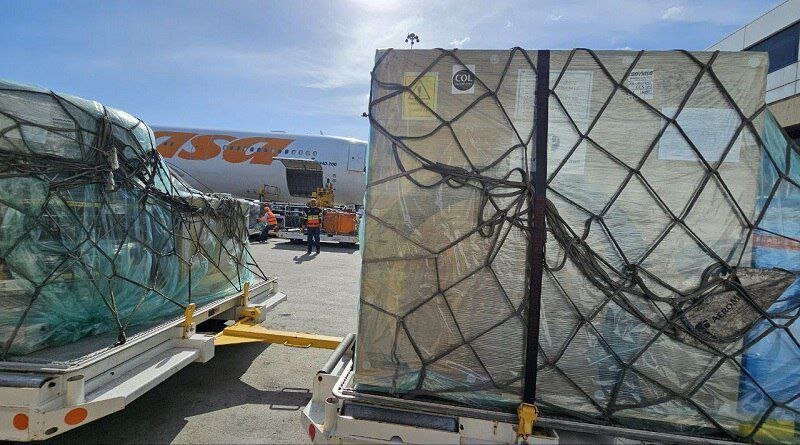Venezuela receives 2.4m doses of Iranian-made polio, hepatitis B vaccines

TEHRAN – Venezuela has received a total of 2.4 million doses of Iranian-made vaccines, including 1.905 million doses of polio vaccine and 502,000 doses of hepatitis B vaccine.
Venezuela’s Deputy Health Minister, Jesús Miguel Osteicochea, received the shipment at Simón Bolívar International Airport in Maiquetía.
It is the second consignment of vaccines received from Iran as part of the two countries' joint health initiative.
“These vaccines are critical to avoid preventable diseases and strengthen the national immunization program,” IRIB quoted Osteicochea as saying.
Hepatitis B is a viral infection that attacks the liver and can cause both acute and chronic disease. The best and most effective way to prevent hepatitis B is to get vaccinated.
The consignment includes the first shipment of oral polio vaccine delivered to Venezuela by Iran’s Razi Vaccine and Serum Research Institute.
Polio is a highly infectious viral disease that largely affects children under 5 years of age. The virus is transmitted by person-to-person spread mainly through the fecal-oral route or, less frequently, by a common vehicle (for example, contaminated water or food) and multiplies in the intestine, from where it can invade the nervous system and cause paralysis.
It can be prevented through immunization. The development of effective vaccines to prevent paralytic polio was one of the major medical breakthroughs of the 20th century. The Polio vaccine, given multiple times, almost always protects a child for life.
Ali Es’haqi, director general of Razi Institute, said on Saturday that there is a shortage of inactivated polio vaccine (IPV) in the world, with countries such as Venezuela facing further restrictions due to international sanctions, Press TV reported.
He described the shipment as a step toward developing international cooperation and broadening the institute’s export markets.
He emphasized that the institute maintained strict adherence to technical standards and international shipping protocols throughout the process.
The vaccine was transported under carefully controlled conditions, with all procedures in place to preserve the cold chain at -20°C, ensuring efficacy during shipment, the official noted.
The official noted that the delivery of the vaccine was not only a response to the need of a friendly country in a critical health situation but also opened a new chapter in Razi Institute’s exports to South America.
He described the export of this important product to Venezuela as “another step in the path of health diplomacy and the expansion of scientific and technological interactions with friendly countries.”
It would also promote the position of the institute as one of the reputable vaccine production centers in the region and the world, he said.
The Iranian official further expressed hope that the move will pave the way for a more effective presence of the institute’s products across Latin America, Eurasia, Africa, and the neighboring countries.
On May 9, Pasteur Institute of Iran exported more than 700,000 doses of Bacillus Calmette-Guerin (BCG) vaccine to Venezuela.
The BCG vaccine has a documented protective effect against meningitis and disseminated tuberculosis in children.
Highlighting the significance of boosting science diplomacy, Ehsan Mostafavi, president of Pasteur Institute of Iran, said this is a successful example of health-based international interactions, which can be recognized as a model for the expansion of Iran’s scientific and technological impacts in the global health sector, ILNA reported.
Pasteur Institute of Iran has been developing the BCG vaccine since 1947. It is one of the strategic products with international standards manufactured in the institute, the official noted.
By recognizing the international capacities and identifying the health needs of other countries, the institute is planning to develop a variety of vaccines to export, Mostafavi added.
The global vaccine market serves as a good opportunity to enhance Iran’s role in the global health chain. Pasteur Institute of Iran intends to play a more active role in promoting public health in the country as well as in developing countries, in line with its historical mission.
MT/MG
